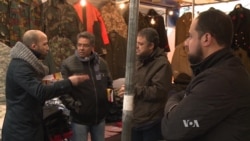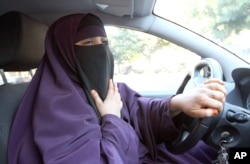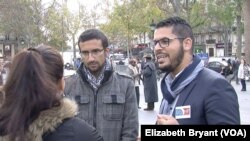Khalid Majid is pushing fliers at a group of men heading down a busy sidewalk in this working-class Paris suburb. "Salaam Alaykoum," he says, and they wave back a greeting.
He tries to snag a young man in a leather jacket — "just two minutes" — but is smilingly rebuffed. Many others, however, are happy to see a new face and hear a new message.
Majid works as a manager at the SNCF rail company; but he's getting name recognition these days as president of the fledgling Union of French Muslim Democrats, or UDMF party, which is making its first run in regional elections.
The first round on Sunday comes at a difficult time for France, as the country emerges from its second wave of terrorist attacks in less than a year. With a state of emergency in force and mounting fears of radical Islam, polls show the far-right National Front party is surging on a law-and-order, anti-immigrant platform.
For its part, the 3-year-old UDMF hopes to counter a rising tide of Islamophobia and give France's five million Muslims a greater political voice.
The clashing visions of Islam and politics are captured in ethnic working-class suburbs around Paris, where the National Front has displayed posters bearing two faces of a single woman — one wearing a ski cap and the country's national colors, and the other in a niqab, or veil — with the tagline, "Choose your suburb."
"Islam and the banlieues [suburbs] have become the center of the political debate," said Alexandre Piettre, a sociologist at the GSRL — or Societies, Religions and Secularity Group — a Paris-based research organization. "So it's normal that a population that always feels itself stigmatized searches for a way to express itself. That's the electorate the UDMF is tapping."
The party is campaigning in the Ile de France region around the French capital. It doesn't expect to win many votes; just getting Muslims — especially young Muslims — to the polls counts as a first success.
"For the past decade, Muslims have been seen through the prism of terrorism, fundamentalism and jihadism," said Nizarr Bourchada, who heads the UDMF's regional ticket. "We want to show that Muslims today participate socially and economically, and will also participate politically."
Candidates and platforms
Many UDMF candidates are solidly middle class and upwardly mobile. Half are women, and many don't wear veils. The party is campaigning on issues like education, jobs and the environment, with platforms similar to other leftist parties. However, it has also weighed in on topics such as repealing a ban on school veils, which strikes a chord among Muslims.
In Montreuil, Majid chats with 28-year-old mother Ferroudja Ghersbousbele about school cafeterias, a hot-button issue after some right-wing mayors banned pork substitutes. The UDMF wants a vegetarian option. "That's secularism," he told her.
"When I was a kid, we lived normally; we didn't categorize different religious," said Ghersbousbele, who doesn't wear a headscarf but supports a woman's choice on whether to do so. "Now they're trying to isolate us, to put us in a group."
Especially after the recent terrorist attacks, for which the Islamic State has claimed responsibility, Ghersbousbele believes Muslim politicians can play a role "in showing that we're not like them."
Gathering momentum
The UDMF is hardly the first European party to assert its Muslim identity. Political movements have emerged in the Netherlands and Britain with little backing or lifespan. In France's Alsace region, a Muslim party founded in 1997 similarly petered out.
Today, sociologist Piettre believes the UDMF is surfing on a larger sense of Muslim identity that has been gathering momentum across Europe.
"It's a kind of assertion of citizenship, and the UDMF fits into this dynamic," he said, especially in France, where many Muslims feel discriminated against.
While the party's score in regional voting is likely to be negligible, it could "nibble" some gains in immigrant-heavy communities, Piettre said, and build enough support over time to strike alliances with other parties.
"The fact they embrace their attachment to secularism and the French republic can help in de-demonizing Muslims," he added of the candidates. "As these people appear in the media and get better known, they'll be seen in a different way."
Party’s future uncertain
The opposite may also happen.
The party tried running for local elections after the first Paris attacks earlier this year, but withdrew amid mounting Islamophobia that it said included threats to some members.
Today, other analysts believe the UDMF may further stigmatize a Muslim population that mostly wants to fit in.
"If French Muslims want to be heard, they have to join traditional parties," said Elyamine Settoul, a researcher at the Paris Institute for Political Studies, who believes the UDMF's impact will remain "marginal."
At the National Front's Paris office, Wallerand de Saint Just goes further, saying the party is stoking divisions.
"The difficulty with Islam is it puts religious law ahead of civil law," said Saint Just, who is heading the Front's ticket in Ile de France. "To run for elections in this religious, sectarian fashion is not acceptable."
UDMF candidates say they can help bridge divides, not widen them.
Shortly after the November Paris attacks, many marked a moment of silence for the victims at the city's Place de la Republique, then spent time explaining their platform.
"We can share a lot of things," Majid said. "We can build a different country, if we do it together."













